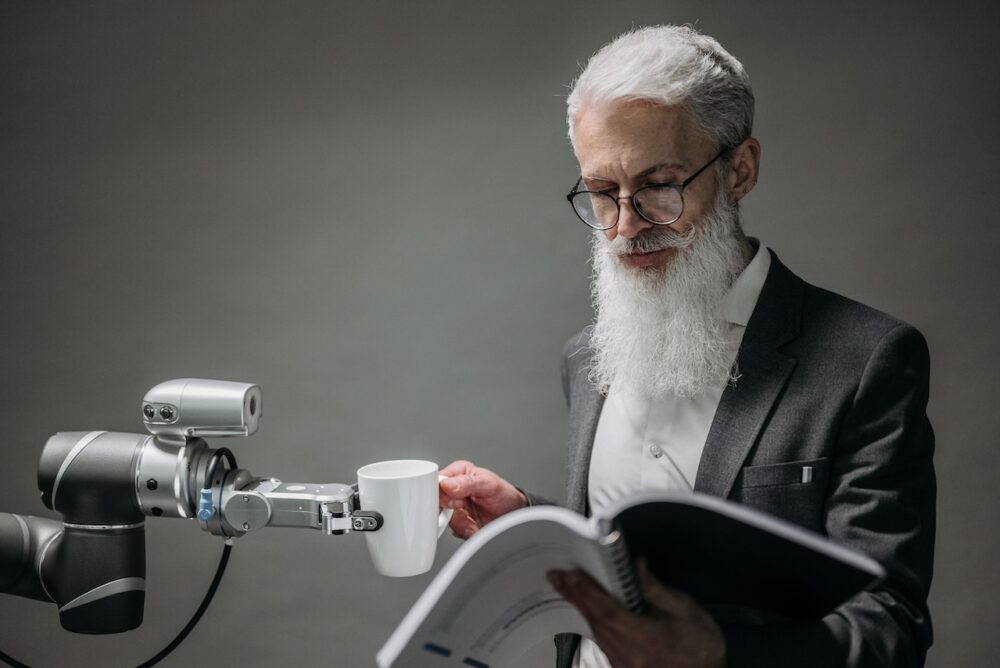AI: Transforming, Not Eliminating, the Jobscape for those who Embrace the Future
As we stand on the threshold of the Fourth Industrial Revolution, Artificial Intelligence (AI) and automation technology are transforming our world. The ensuing fear that AI will replace humans in the workplace is rife. However, the narrative should not be about AI replacing jobs, but rather reshaping them. AI is the future, and it is the willingness to adapt and upskill that will determine who thrives in this new jobscape.
AI — The Tool, Not The Taskmaster
AI is an innovative tool that will change the way we approach our work rather than a taskmaster that will usurp our jobs. For example, look at the healthcare industry. AI can analyze vast amounts of data faster than any human, and with machine learning, it can find patterns and make diagnoses in record time.
Transforming Healthcare
In the healthcare industry, we are witnessing the rise of roles such as medical data analysts and health informatics specialists. These individuals are skilled in AI and machine learning, taking the insights gleaned from AI and applying them to improve patient outcomes. The demand for these roles underscores the transformation rather than elimination of jobs in healthcare.
But it’s the human touch, the empathetic doctor, who takes these insights and turns them into treatment plans for patients. Here, AI doesn’t eliminate jobs; it enhances them.
The Retail Sector Reimagined
The retail sector is another area where AI has been transformative rather than destructive. From virtual fitting rooms to predictive analytics for stock control, AI has made processes more efficient. But rather than eliminating jobs, this has created new roles. Data scientists, AI specialists, and personalization experts are now integral parts of retail teams.
Furthermore, As retail becomes increasingly digitized, the need for people skilled in digital marketing, AI, and data analytics is growing. Traditional roles such as sales assistants and store managers are evolving, becoming more digitally focused.
For example, store managers now use predictive analytics for inventory control. Retail companies are also increasingly employing chatbots, creating new roles in the process, such as chatbot trainers who help these AI-powered tools provide better customer service.
“The human touch, the connection with customers, is still paramount to the success of the retail industry”
A New Age for Manufacturing
Automation and AI in the manufacturing sector are perhaps the most visible representation of this transformation. Robotic arms may assemble parts faster than humans, but they can’t innovate or problem-solve in the same way. Instead, humans have shifted towards supervisory roles, maintenance of these systems, and high-level problem solving. This shift requires new skills like programming and systems analysis, which has spurred an increase in demand for these roles.
Beyond the factory floor, AI is reshaping the manufacturing industry by creating jobs in fields like AI programming, robot coordination, and systems analysis. With increased automation, there is a greater need for human workers to ensure these systems function effectively, and to intervene when they don’t.
Transportation’s AI-driven Transformation
AI has left no industry untouched, and transportation is no exception. With the advent of autonomous vehicles, fears of job loss are common. Yet, these changes have created a need for experts in AI, data analysis, and cyber-security. Mechanics are becoming technicians, drivers are becoming operators, and transport planners are morphing into logistics analysts.
As AI continues to disrupt the transportation sector, it’s creating roles we couldn’t have imagined a decade ago. Simultaneously, AI is powering smart traffic management systems, creating jobs for traffic analysts and AI developers who can optimize these systems.
Agriculture — Farming the AI Way
Farming, one of the oldest human industries, is also experiencing an AI revolution. AI-powered drones, precision agriculture, and automated irrigation systems have changed the way we farm. But, instead of replacing jobs, it has created new opportunities.
Farmers are now collaborating with drone operators and remote sensing specialists to optimize crop yields. This intersection of technology and agriculture has given rise to “agritech” roles such as agricultural data scientists, precision farming specialists, and farm-based IoT (Internet of Things) specialists.
Adapting to the Future of Work
AI and automation are transforming the nature of work across sectors, but they’re not eliminating jobs for those willing to adapt. As we’ve seen, new roles are emerging that require a blend of human intuition, creativity, and emotional intelligence, paired with AI proficiency.
AI is changing the way we think about work. It’s about integrating AI with human skills to create roles that didn’t exist before. It’s about understanding that AI proficiency, coupled with human intuition, creativity, and emotional intelligence, is the key to future job success.
The Future Is Yours To Shape
So, the narrative isn’t about job loss, it’s about transformation and adaptation. It’s about learning to work with AI, using it as a tool to amplify human potential, not as a replacement for it.
In the grand scheme of things, AI is not a threat to jobs, but an opportunity for those ready to shape their future. Learning to work with AI and leveraging it as a tool to enhance human potential is the way forward. AI proficiency is becoming as crucial as traditional educational qualifications, and those ready to embrace it will be the ones to thrive in the future job market.
Conclusion
In this evolving landscape, the willingness to learn and adapt is the key to thriving. The jobs that exist in the future may be different from those today, but they will still require a distinctly human touch.
In the face of an AI-driven world, embracing change and learning new skills is the key to thriving.
“The narrative isn’t about job loss; it’s about job transformation.”
AI won’t eliminate jobs, it will merely transform the jobs of those who don’t embrace change. So, embrace the future — it’s already here.

